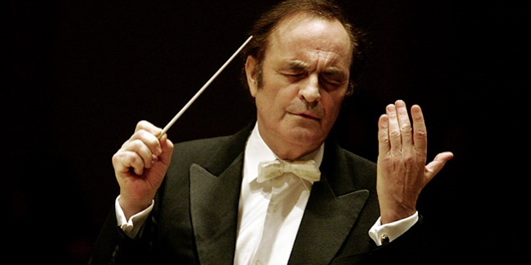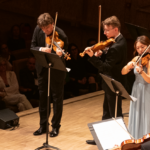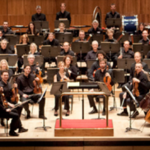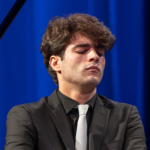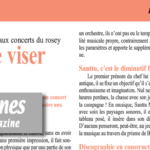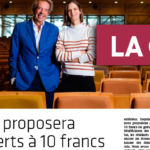From Wikipedia, the free encyclopedia
Dutoit was born in Lausanne, Switzerland, studied there and graduated from the Conservatoire de musique de Genève, where he won first prize in conducting. Then he went to the Accademia Chigiana in Siena by the invitation of Alceo Galliera. In his younger days, he frequently attended Ernest Ansermet’s rehearsals and had a personal acquaintance with him. He also worked with Herbert von Karajan at Lucerne as a member of the festival youth orchestra and studied with Charles Munch at Tanglewood. Dutoit began his professional music career in 1957 as a viola player with various orchestras across Europe and South America. In January 1959, he made his debut as a professional conductor with an orchestra of Radio Lausanne and Martha Argerich. From 1959 he was a guest conductor of the Orchestre de la Suisse Romande and the Lausanne Chamber Orchestra. After this, he was the conductor for Radio Zurich until 1967, when he took over the Bern Symphony Orchestra from Paul Kletzki, where he stayed for eleven years.
While head of the Bern Symphony, he also conducted the National Symphony Orchestra of Mexico from 1973 to 1975, and Sweden’s Gothenburg Symphony from 1975 to 1978. Dutoit was principal guest conductor of the Minnesota Orchestra in the early 1980s.
In 1977, Dutoit became the Artistic Director of the Orchestre Symphonique de Montréal (OSM). During his tenure, the recording profile and reputation of the OSM increased as he managed to make it one of the leading orchestras in the French-speaking world. Throughout these years, he called for a new symphony concert hall for Montréal, which would be announced by three prime ministers. Unfortunately, the promise would never materialize during his nearly 25 years at the helm of the OSM, even though the foundation stone was laid in 1985 by Premier René Lévesque, Mayor Jean Drapeau and Jacques Parizeau.[1]
However, his association with the Orchestre symphonique de Montréal ended abruptly in controversy in 2002, when some OSM musicians objected to the work environment created by Dutoit. In April 2002 Dutoit initiated dismissal procedures against two OSM musicians. This led to an uprising within the orchestra. At the time of his departure, he was threatened with a lawsuit in Québec Superior Court by Quebec Musicians Guild president Emile Subirana, who was subsequently disavowed and deposed in a vote by a majority of Montréal musicians,[2][3][4] Emile Subirana wrote an open letter saying that Dutoit had verbally and psychologically abused his musicians and that they now wanted it to stop. Upon hearing this Dutoit abruptly resigned, never to conduct in Montreal again except for two special performances held Feb. 18 and 20, 2016, during the Montreal en Lumiere Festival, at the new concert hall.[5][6] But according to the OSM’s director of communications, « Dutoit was simply following the rules of the collective agreement in requesting a meeting with the two musicians to discuss their work, as a first step that might lead to dismissal. La Scena Musicale has learned that this is the first time Dutoit has initiated such a procedure since the last musician was fired back around 1980. Never having had the need to refer to clause 12.05 c) until last month, the OSM musicians were shocked at its contents. It is understandable, then, that the musicians were upset to find Dutoit and the OSM seemingly taking advantage of this clause. As a result they asked their union to save the jobs of their two colleagues. Guild president Emile Subirana must have realized that, given the details of the collective agreement, if Dutoit were to dismiss the musicians, he could really do nothing more to save the jobs. Instead, he resorted to playing the harassment card and threatening a law suit. The strategy might have been sound if Subirana had started the negotiations privately. It is now clear that the decision to go public with the threat of a lawsuit was a ploy to disgrace Dutoit, forcing him to resign while diverting attention from the Guild’s mishandling of clause 12.05 c). Articles in the daily newspapers suggest that the majority of OSM musicians were surprised by Subirana’s actions and that these actions do not represent their will. If this is the case, the musicians had better change the mandate given to the union ».[7] Dutoit partly attributed his sensational departure from the Orchestre symphonique de Montréal (OSM) to an « anti-artistic » labour contract that limited rehearsals, particularly on tour, and therefore the possibilities of elevating the orchestra’s international stature.
Charles Dutoit has earned more than 40 international awards and distinctions, including two Grammy Awards (USA), several Juno Awards (Canada), the Grand Prix du Président de la République (France), the Prix mondial du disque de Montreux (Switzerland), the Amsterdam Edison Award, the Japan Record Academy Award, and the German Music Critics’ Award. He and the OSM made many recordings for the Decca/London label.
Dutoit first conducted the Philadelphia Orchestra in 1980. From 1990 to 1999, he was music director of the orchestra’s summer concerts at the Mann Center for the Performing Arts. Since 1990, he has been the artistic director and principal conductor of the Philadelphia Orchestra’s summer festival in Saratoga Springs, New York, a post he relinquished in August 2010. In 1991, he was made an Honorary Citizen of the city of Philadelphia. As of the 2012-2013 season, he became Conductor Laureate of the orchestra.
Since 1990, Dutoit has directed the Pacific Music Festival in Japan. From 1991 to 2001, Dutoit was Music Director of the Orchestre National de France, with whom he made a number of critically lauded recordings and toured extensively. In 1996, he was appointed principal conductor of Tokyo’s NHK Symphony Orchestra. In 1997, he was made an honorary Officer of the Order of Canada. He is also one of a handful of non-Canadian citizens to be a Grand Officer of the Ordre national du Québec.
In February 2007, he was named chief conductor and artistic adviser of the Philadelphia Orchestra, for a contract of four years, effective September 2008.[8] In April 2007, Dutoit was named principal conductor and artistic director of the Royal Philharmonic Orchestra as of 2009.[9] Since July 2009 Dutoit has also served as the music director of the Verbier Festival Orchestra in Switzerland.[10]
In April 2014, Dutoit received the Lifetime Achievement Award by the International Classical Music Awards. He was also made an honorary member of Fondation Igor Stravinsky in Geneva.
In February 2016, Charles Dutoit will make an extraordinary and unexpected return to the helm of the OSM for two concerts presented by the MONTRÉAL EN LUMIÈRE festival, engendered by its founder Alain Simard, a personal friend of the Maestro. Making his first appearance in the new symphony concert hall that he so avidly sought for so long, Dutoit has selected a program assembling the works that marked his earliest success with the OSM,[11] featuring pianist Martha Argerich, his former wife, also part of their first international tour in 1981.[12] Over 3000 tickets sold out in just a few hours for the two historic concerts, which were announced a year in advance.[13]

